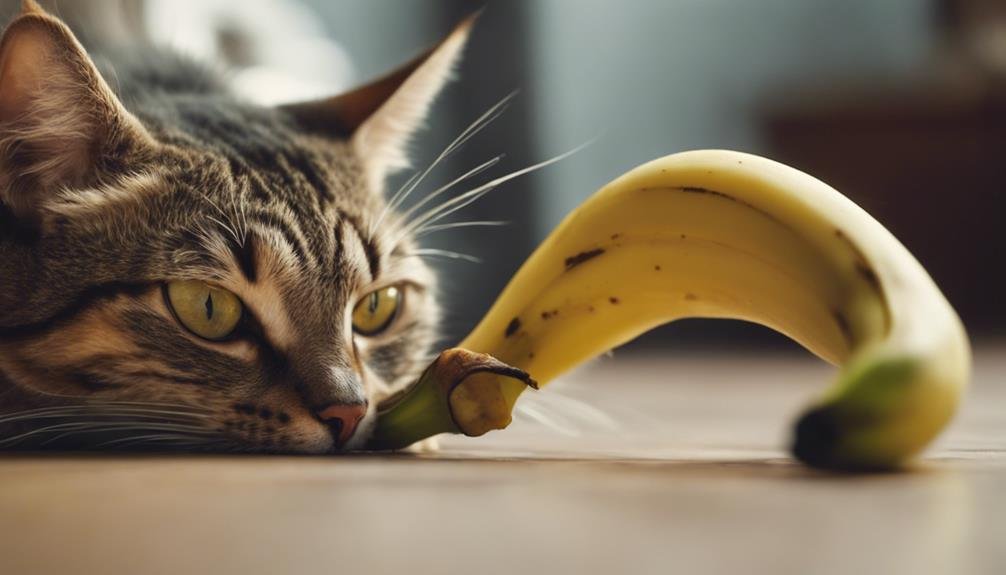As feline enthusiasts seek to provide optimal care for their beloved companions, the question of whether cats can consume bananas remains a topic of interest. While cats are known for their carnivorous nature, the occasional introduction of fruits like bananas into their diet sparks curiosity about the potential benefits and risks involved.
Delving into the intricacies of feline nutrition and the implications of offering bananas to cats unveils a nuanced perspective that goes beyond mere curiosity. By understanding the four key considerations when feeding bananas to cats, pet owners can navigate this dietary choice with prudence and ensure their feline friends' well-being.
Key Takeaways
- Cats can eat bananas as an occasional treat, but they should not be a regular part of their diet.
- Consult a veterinarian before introducing bananas to your cat, especially if your cat has health conditions like diabetes.
- Cats are obligate carnivores, and their nutritional needs are best met with a complete and balanced commercial diet.
- Monitor your cat for any adverse reactions when feeding bananas, and limit treats to no more than 10% of their daily caloric intake.
Nutritional Needs of Cats
Cats, as obligate carnivores, have specific nutritional requirements that differ significantly from those of humans and dogs. Their diet must include high levels of protein, taurine, arachidonic acid, vitamins like A and B, and minerals such as calcium and phosphorus. These nutrients are primarily found in animal-based products, making a complete and balanced commercial diet the best choice for meeting a cat's nutritional needs.
While occasional treats like bananas might seem harmless, they offer little benefit to cats and can even pose risks if not carefully monitored. It's crucial to consult with a veterinarian before introducing any new human foods to your feline companion to ensure they maintain optimal health and well-being.
Risks Associated With Feeding Bananas
When considering incorporating bananas into a cat's diet, it is essential to be aware of potential risks associated with feeding this fruit to felines. While bananas are generally non-toxic to cats, there are still some risks to consider.
Cats are obligate carnivores, and their digestive systems may not be equipped to efficiently process fruits like bananas, which are high in sugar and carbohydrates. Feeding bananas in excess can lead to digestive upset, such as vomiting or diarrhea, especially in cats with sensitive stomachs.
Additionally, some cats may simply not be interested in bananas due to their preference for meat-based foods. It is important to monitor your cat for any adverse reactions when introducing bananas or any new foods into their diet.
Precautions for Feeding Bananas

To ensure the safety of your feline companion when offering bananas as a treat, it is crucial to take specific precautions regarding their consumption. Here are some key steps to follow:
- Consult your veterinarian: Before introducing bananas or any new food to your cat's diet, it's important to seek professional advice.
- Monitor portion size: Offer bananas as an occasional treat and ensure they make up only a small percentage of your cat's overall diet.
- Prepare bananas appropriately: Remove the peel and cut the fruit into small, manageable pieces for your cat to eat safely.
- Watch for any adverse reactions: Keep an eye out for any signs of digestive upset, such as vomiting or diarrhea, after feeding your cat bananas.
Alternatives to Bananas for Cats
When considering suitable treats for feline companions, exploring alternative options to bananas can provide a varied and nutritionally beneficial selection for cats. Watermelon can be a safe and hydrating option for cats, offering vitamins A, C, and B6; however, it should be fed in moderation to prevent digestive issues.
Strawberries are another safe choice, rich in fiber and vitamin C, but be sure to remove the leaves and stem and monitor for any signs of allergies.
Mango, although safe in small amounts, is high in natural sugars and should be fed sparingly, with the skin and pit removed. Introducing these fruits cautiously and in appropriate portions can help diversify your cat's treat options while keeping their health in check.
Conclusion
In conclusion, while bananas are non-toxic to cats, they should be fed in moderation due to their high sugar content. Consulting with a veterinarian before incorporating bananas into a cat's diet is essential to ensure their nutritional needs are met.
Interestingly, studies have shown that only 15% of cat owners consult with a veterinarian before introducing new foods to their feline companions, highlighting the importance of informed decision-making for the health and well-being of cats.




